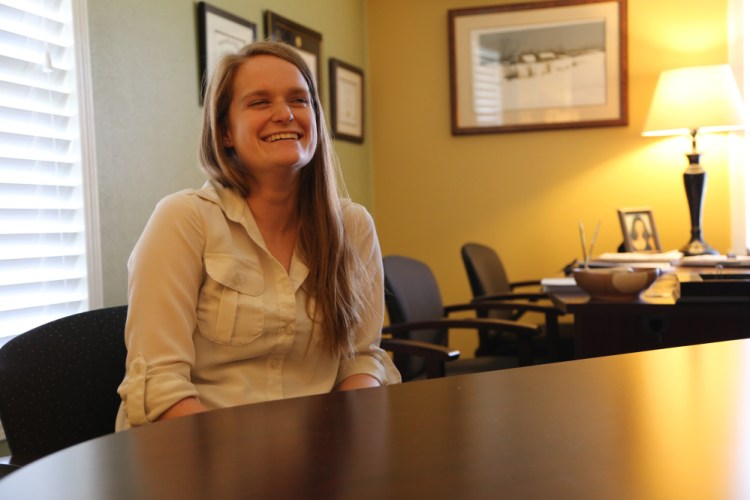Last fall, Rae-Ann MacLellan-Hurd found out she was one of 34 students nationwide to win an Environmental Protection Agency fellowship for environmental research in the physical, biological, health and social sciences. The rising college senior will be using the $50,000 in part to fund a research project on Lake Winnecook, near the Unity College campus, that she began as a freshman. She’ll also pay down some of her tuition. We called her up as she was heading home from her summer job at the EPA’s regional laboratory in North Chelmsford, Massachusetts, and talked about everything from the way Hurricane Katrina shaped her academic interests to the horrors of student debt and why Lake Winnecook is so mucky.
FRESH FROSH: When MacLellan-Hurd was a freshman, a friend asked her to join in on a research project at Lake Winnecook, which Unity students regularly use for their studies. It’s a very shallow lake, and in the summer is subject to very severe algae blooms. “You can barely see like a foot into the water,” MacLellan-Hurd said. “You can put your hand in it, and it is completely green.” The lake’s declining water quality – or more technically put, its phosphorus loading – which she said began about 10 years ago, is a regular topic of conversation at Unity. “Everyone is aware of it and pretty concerned.” Lake Winnecook is the fifth most impaired water body in the state, she said.
COMMON CAUSE: That’s cause for concern not just because no one wants to go swimming. “The algae takes a lot of the dissolved oxygen out of the lake,” she said. “It can make it hard for some fish to breathe. It has a huge impact on the whole ecosystem.” This happens about two or three months out of the year “when it is really hot.” MacLellan continued to be intrigued by the lake’s problems, and kept researching it during her sophomore year, looking more deeply into what happens in the sediment-water interface, where the gradients between the water and the lake’s natural sediments meet. She’s got three sites where different sources feed in or out of the lake, and she’s taking samples at each to track changes. The way she’d explain this to the guy on the barstool next to her? “I just say I am trying to determine what is coming in and and out of the lake. Right now everyone is speculating about what is in there. Through this project I’ll actually be measuring it. We’ll be able to see what is really going on and have a map of it.”
MAPPING THE SLUDGE: Her sampling process entails entering each river that feeds into the lake to measure the discharge levels – either by wading or via kayak – and taking water samples from near the river bank and from the middle. Once a month she’ll take sediment core samples. In the future, other Unity students can continue to plug in similar data. But she hopes the implications of her work will extend beyond the shores of Lake Winnecook. “It can be used as a case study for other areas that are having algae blooms, especially other shallow lakes.”
WHY WATER? Was her interest in water quality born at Unity College? More like elementary school in Mississippi. “I lived through (Hurricane) Katrina,” she said. “I was like 10 at the time.” One of the wings at her school was badly damaged. “I was lucky in that my school wasn’t completely torn down.” Were students evacuated? Yes, and “we weren’t allowed back for a couple of weeks afterward.” Her family went to Florida in their camper. “We had a few days warning,” she said. “It was standard drill by then. It wasn’t like the family’s first hurricane outing.” The devastation changed her, although she didn’t realize it until much later. “It shaped me to go into water quality.”
FINDING UNITY: All through high school she planned to study environmental science. When a brochure arrived from Unity, she felt she’d found her match. “It is just, like, a one-of-a-kind school,” she said. “I just kind of felt connected to it.” She’s not limiting herself to staying in Maine after commencement next spring, however. “I want to go and travel as many places as I can.” MacLellan-Hurd said she’ll go on to graduate school, possibly to get her master’s in environmental engineering. This summer she has an internship with the EPA’s North Chelmsford lab, studying river quality, both from the lab and on the water. “We are going to be deployed on the Merrimack in a few weeks.”
GET OUT OF DEBT FREE? Will that $50,000 help fund graduate school? More likely it will just go to pay down some of what she already owes. “I have debt from my first two years at Unity,” she said. How about her parents, were they proud? “They were all pretty excited,” she said. Her mother “kind of got bug-eyed.”
Send questions/comments to the editors.




Success. Please wait for the page to reload. If the page does not reload within 5 seconds, please refresh the page.
Enter your email and password to access comments.
Hi, to comment on stories you must . This profile is in addition to your subscription and website login.
Already have a commenting profile? .
Invalid username/password.
Please check your email to confirm and complete your registration.
Only subscribers are eligible to post comments. Please subscribe or login first for digital access. Here’s why.
Use the form below to reset your password. When you've submitted your account email, we will send an email with a reset code.